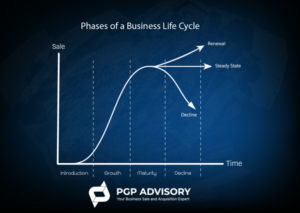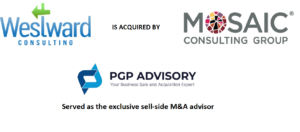
Why Your Business Should ALWAYS Be Ready To Sell
Whether you have exit strategies in place or you plan to operate your business for a long period of time, as an entrepreneur, you should always be ready to sell your business. Many owners of private businesses fail to recognize the importance of running their companies in a way that ensures they are fully prepared should the need to sell arise.
Based off experience helping countless business owners reposition and restructure their businesses, PGP Advisory always encourages clients to the adopt the prepared mindset of ‘always be ready to sell,’ even if they have no intention of selling. Our goal today is to demonstrate how always being ready to sell will position your company for success regardless of where you are on your business journey.

Be The Buyer
Let’s begin by placing ourselves in the position of a prospective investor. A savvy business investor will want to see a well-oiled, automated, documented, efficient, and streamlined machine when they look under the hood.
Potential buyers almost always can see through a rushed attempt to make a business seem as though it’s running at its full potential. Failing to put solid financial systems in place or to make sure key management team members are fully capable of leading when you’re not around is like waiting until the week before your child graduates from high school to research college admissions requirements. Simply put, it’s too late.
Most sellers do not consider buyer needs until a sale is imminent, which often results in them scrambling to make changes or accepting a reduced sale price.
Prepare to Sell, Even If You Don’t
Ready to sell, does not mean your business has to be on the market. It means that if a sale arose, or circumstances change, your business will immediately be more attractive to buyers. The intention here is that by being ready to transition to a new owner, putting solid systems in place, employing great staff and reducing reliance on the you as an owner, will inevitably ensure you get the best price when it is time to sell. This also means that it becomes easier to run your business and you can spend more time working on your business instead of in it. At times, forces beyond our control (e.g. COVID-19, economic recessions, difficulty accessing capital, rising rates, etc.) may affect the timing of your decision. Many sellers took advantage of the premium paid by buyers in the seller’s market for businesses over the past few years. It pays “literally” to consider exiting when there is strong demand and favorable conditions for acquiring businesses.
How to Get Started
PGP Advisory suggests beginning the process with properly setting up your business’ documentation. Are your company’s leases and agreements current, secure and available? Insider Tip – Whenever you renegotiate your lease agreement, consider asking the landlord to agree to subordinate if you (or a buyer) decide to seek bank financing. Be sure your business’ financials are in order, are your Profit and Loss Statements, Balance Sheets, and tax returns accurate, easily accessible, and showing positive trends? We also recommend giving serious thought to your company’s systems and procedures- do you have an operational playbook? Take a look at your role within your company and reduce the need for you to be involved on a daily basis as you can delegate to adequate and well-trained staff.
Takeaways
Owners who adopt a prepared mindset receive the dual benefit of a business with higher value to any external buyer, as well as enhanced profits regardless of whether a sale ever occurs. Being ready for a sale, means making your business more attractive to an outside investor and means your business is more prepared for any eventuality outside of your control that may force you into sale. These tips will help you keep your operations in excellent shape, and they will help your company be more nimble and adaptive to change with a stronger foundation to stand on.
Check out the link below to…
Explore Tax and Cost Savings Opportunity

What’s In a Number? Must-Have Metrics For Your Business
April Kicks Off Financial Literacy Month
Financial Literacy Month is a nationally recognized campaign to bring awareness to the need for more financial education in schools and for adults. During Financial Literacy Month, financial institutions, nonprofits, and human service agencies increase their focus on the importance of financial literacy through events, programs, and counseling.
We see a goal that goes beyond helping just consumers learn more about finances to helping entrepreneurs actually improve the financial management of their most valuable asset- their business. The result is improved business and personal financial stability and success.
Why Financial Literacy Matters
- Parents rank teaching financial responsibility to their children near the top of their wish list.
- Only a handful of states require high school students to take a personal finance course before graduation.
- Poor financial literacy leads to poor decision-making which leads to poor behavior which limits the household’s ability to reach its financial goals.
- Increased financial literacy will help drive wealth for small businesses and their owners.
The Importance of Business Metrics
Last month, PGP Advisory discussed the importance of incorporating our top 7 value drivers into your business strategy to increase cash flow, as well as reduce risk, thus enhancing the overall value of your company. We established that the valuation process involves an assessment of your company and should be a crucial part of any business owner’s standard operating procedure.
The essential next steps to running a successful business, require a thorough analysis of the work, sales, and financial results. This cannot be done without tracking relevant business metrics. Measuring your organization’s performance requires thorough data collection and analysis. But with countless examples of business metrics, how do you know which ones are worth tracking? The ideal combination of key performance indicators (KPIs) will depend largely on your individual business’ needs.

What Gets Measured – Gets Managed
Business Metrics Every Company Should Know
For all businesses, it is critical to track operational metrics such as output, quality, and productivity on a regular basis. The specific measures will vary from company to company, but your productivity metrics improve operations by highlighting opportunities to standardize work, eliminate waste, and solve systemic problems. The result is happier customers, reduced costs, and a consistent operation that is easier for you (and any future owner of the business) to run.
Gross Margin is one of the most important metrics that an entrepreneur should know. It is crucial to running your business on a day-to-day basis. Gross margin lets you know how much of each sales dollar is available to pay overhead and profit after direct expenses are paid. Many businesses are seeing input costs such as wages, materials, and freight rise. Businesses with strong market positions are often able to adjust pricing to maintain their gross margins.
ROI measures the efficiency of an investment. It can be used to compare different investments made into your business. It is a great way to indicate what is working and what isn’t. For companies looking to grow through acquisition, ROI is a simple metric to compare the relative attractiveness of a potential target.
The current ratio is used to test a company’s liquidity and working capital. The current ratio is the company’s current assets divided by its liabilities. Calculating the current ratio, you will see if your company is readily available to pay its short-term liabilities like taxes, debts, and expenses. A business should keep its current ratio over 1 which means that there is enough working capital for healthy operation. For growing companies, it is an important indicator of whether or not you have sufficient working capital to fuel continued growth.
These two metrics answer the following: How much do you make per customer or lead during its lifetime? How much does it cost to acquire a customer? Knowing your LTV and CAC of your customer is a piece of the crucial information you can obtain. Every dollar of revenue is not equal. Recurring revenue from loyal, “sticky” customers are a valuable asset for your company. CAC and LTV are measures that inform which customers to target, the most effective and efficient sales and marketing approach, and how to ultimately grow more profitably.
The importance of web-analytics can’t be argued in the digital era. Every online business should have a basic understanding of web analytics.
What’s In a Number?
Why should your business be so concerned with metrics? For starters, these metrics are golden tidbits of information and can mean the difference between success and failure. There are many more metrics that exist for your company to track, such as project management metrics. The ones that matter most depend on your specific type of business. For example, if you sell products, tracking your inventory size may be important.
PGP Advisory recommends your company remain judicious in your choice of metrics to track. Business owners can easily become overwhelmed with data or spend too much time just collecting and analyzing rather than using the insights to actively manage your business.
With the appropriate metrics for your company in hand, you can steer your organization in the right director toward achieving your business goals.
PGP Advisory’s Software Implementation Client- Westward Consulting- Completes Sale

PGP Advisory, a leading mergers and acquisition advisory practice and San Antonio business broker, is pleased to announce that it served as the exclusive M&A advisor to Westward Consulting LLC, a strategic Ultimate Kronos Group workforce software implementation partner, in its sale to Mosaic Consulting Group on July 1. With this acquisition, Mosaic Consulting Group, a long-time Ultimate Software partner focused on human capital management (HCM) support and service, is adding Westward Consulting’s Kronos experience and focus on workforce management, to their services.
“We worked with John West, Founder and CEO of Westward, over the past few years to prepare his company for this significant milestone. The cultural fit of the combined organization paired with enhanced solutions offerings into the marketplace position Mosaic to create and deliver increased value to its clients, employees, and partners.” Jason Brown, Managing Partner, PGP Advisory
John West, Westward CEO adds, “This is an exciting time. Two best-in-class teams are coming together to offer a full suite of services to our clients. Now, we will be able to help our clients seamlessly optimize and hone their team related strategy, processes and technologies”
Westward Consulting was founded in 2015 as a workforce consulting company with a mission that guides organizations to exceptional workforce performance. The Westward team exemplifies their team’s values: Family, Ethical, Fun and Generous. They deliver an exceptional client experience by focusing on thinking outside the box. Finding innovative solutions for their clients is at their core.
About PGP Advisory
PGP Advisory is a M&A advisory firm that helps our clients create value in the transaction process by offering Fortune 500 experience, tools, and strategies to small and midsized businesses. We seek out, identify, and solve problems for our clients throughout the entire transaction process. We leverage both our deal and operational expertise and experience to support our clients’ desired deal outcomes.

What You Need to Know About Foreign Buyers

There is a potentially lucrative group of buyers that many sellers don’t initially think about. We are talking about foreign buyers. While there are some hurdles to working with these types of buyers, it is important to note that there are many huge advantages as well. Let’s take a closer look.
How Are Foreign Buyers Different?
At the top of the list of ways in which foreign buyers are different is that they are often seeking a visa. Another commonality among foreign buyers, one that will surprise many, is that they may want access to the U.S. educational system.
It is common for foreign buyers to want to buy a business so that they can get their children into a particular U.S. school district or college. Sometimes the desire to be eligible for state tuition also plays a role in the selection of a business and the decision-making process. In this sense, business location takes on a level of importance that it might not have for domestic buyers.
It is important to keep in mind that there are cultural and business differences that play a role with foreign buyers. Everything from a different use of business terminology to expectations can play a role. This could impact negotiations.
What About Visas and Immigration?
One of the most important things to remember is that foreign buyers are often navigating the complex world of visas and immigration. Whether or not a visa is issued can dramatically impact whether or not a deal ultimately takes place. This fact is often built into agreements. For example, a purchase condition may be conditional upon visa approval. Nonrefundable deposits may also play a role in the process.
What Do Foreign Buyers Really Want?
Foreign buyers have been impacted by the pandemic too. Yet, some factors remain unchanged. Not too surprisingly, they will want to see that a business is profitable. In this regard, you should be able to showcase profitability in a clear fashion. You can expect foreign buyers to want to see tax returns and all the typical documentation that you’d need to provide to any buyer.
A second factor that foreign buyers are interested in is longevity. If your business has successfully operated for decades, this will be a major advantage.
Ultimately, most of what domestic buyers are looking for in a business will translate over to what foreign buyers are seeking as well. With that stated, however, there are factors that are often unique to foreign buyers. As mentioned above, navigating the often-complex visa process can add a wrinkle to the entire process.
Copyright: Business Brokerage Press, Inc.
The post What You Need to Know About Foreign Buyers appeared first on Deal Studio – Automate, accelerate and elevate your deal making.

Essential Meeting Tips for Buyers & Sellers

The buyer-seller meeting is quite often a “make or break” meeting. Your business broker or M&A Advisor will do everything possible to ensure that this meeting goes as well as possible.
It is vitally important to realize that rarely is there an offer before buyers and sellers actually meet. The all-important offer usually comes directly after this all-important meeting. As a result, you want to ensure that meetings are as positive and productive as possible.
Buyers need to understand how the process of selling a business works and what is expected of them from the process. Buyers also need to understand that following their broker’s advice will increase the chances of a successful outcome.
Sellers should be ready to be honest and forthcoming during the meeting. They also want to be sure to not say or do anything that could come across as a strong-armed sales tactic.
Asking the Right Questions
If you are a buyer preparing to meet a business owner for the first time, you’ll want to make sure any questions you ask are appropriate and logical. It is important for buyers to place themselves in the shoes of the other party.
Buyers also shouldn’t show up to the buyer-seller meeting without having done their homework. So be sure to do a little planning ahead so that you are ready to go with good questions that show you understand the business.
Building a Positive Relationship
Buyers should, of course, plan to be polite and respectful. They should also be prepared to avoid discussing politics and religion, which often can be flashpoints for confrontation. When sellers don’t like prospective buyers, then the odds are good that they will also not place trust in them.
For most sellers, their business is a legacy. It quite often represents years, or even decades, of hard work. Needless to say, sellers value their businesses. Many will feel as though it reflects them personally, at least in some fashion. Buyers should keep these facts in mind when dealing with sellers. A failure to follow these guidelines could lead to ill will between buyers and sellers and negatively impact the chances of success.
Sellers Should Be Truthful
Sellers also have a significant role in the process. While it is true that sellers are trying to sell their business, they don’t want to come across as a salesperson. Instead, sellers should try to be as real and honest as possible.
Every business has some level of competition. With this in mind, sellers should not pretend that there is zero competition. A savvy buyer will be more than a little skeptical.
The key to a successful outcome is for business brokers and M&A Advisors to work with their buyers and sellers well in advance and make sure that they understand what is expected and how best to approach the buyer-seller meeting. With the right preparation, the odds of success will skyrocket.
Copyright: Business Brokerage Press, Inc.
The post Essential Meeting Tips for Buyers & Sellers appeared first on Deal Studio – Automate, accelerate and elevate your deal making.
